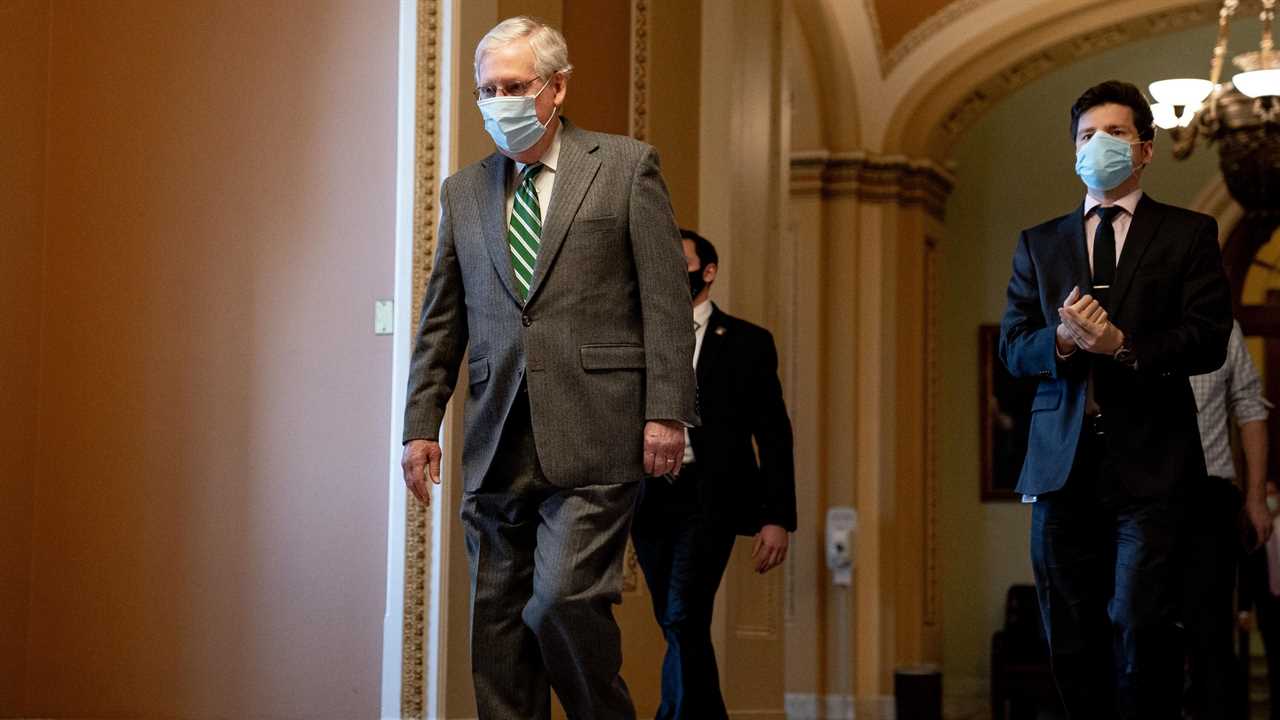
WASHINGTON — Efforts to reach a year-end agreement on a stimulus package to prop up the shuddering economy faltered on Thursday as aides to Senator Mitch McConnell, the majority leader, signaled privately that most Republicans were unlikely to endorse an emerging bipartisan compromise without changes.
In discussions with other congressional leaders, Mr. McConnell’s advisers expressed concern that Republicans could not accept liability protections for businesses that they consider too limited or funding for state and local governments that they have long resisted. Both are central elements of a $908 billion outline drafted by moderate in both parties.
The divisions on those two issues have muddied the prospects for an agreement on both a stimulus measure that lawmakers in both parties have agreed is necessary before Congress adjourns and a catchall government funding bill that must pass to avert a shutdown. And some lawmakers have begun aggressively pushing for legislation that would send $1,200 direct payments to most Americans in any package.
The warning from Mr. McConnell’s staff aides reflected the significant hurdles for the unfinished $908 billion outline, and for the stimulus talks overall. Republicans have long resisted providing billions of dollars for states, and Democrats have deemed Mr. McConnell’s proposal for a sweeping coronavirus liability shield for companies as a nonstarter that would harm workers.
Mr. McConnell’s concerns about the moderates’ compromise was earlier reported by Politico, and was relayed on the condition of anonymity by a senior Democrat familiar with the conversation between the senator’s aides and other congressional leaders. Mr. McConnell’s office declined to comment, though he has made it clear that he was cool to the compromise, instead urging his colleagues to drop both the liability shield and the state and local aid in favor of a much narrower package.
“I think the question I have is, will we say, ‘Hey, look, we were successful in getting $908 billion, getting people together to that number,’” said Senator Mitt Romney, Republican of Utah and one of the lawmakers involved in the current bipartisan discussions. “We’ve solved a whole series of elements — maybe on state and local, the liability, we wait, given the time frame, until next year.”
But top Democrats have rejected the suggestion from Mr. McConnell and other Republicans that Congress put aside those two issues. They have also panned a $916 billion alternative that the White House presented on Tuesday. That proposal, outlined by Steven Mnuchin, the Treasury secretary, failed to revive lapsed federal supplemental jobless payments in favor of a round of $600 stimulus checks, half the amount approved this year.
Speaker Nancy Pelosi of California noted on Thursday that Congress had previously stayed through Christmas to haggle over unfinished spending legislation. “We have to have a bill,” she told reporters at her weekly news conference, “and we cannot go home without it.”
The prospects for a one-week stopgap government funding bill intended to avert a shutdown on Friday and buy additional time for negotiations were unclear in the Senate on Thursday, as lawmakers struggled to secure consensus on a sweeping military policy bill and the spending measure.
As time ran short for a deal, members of both parties formed an unlikely alliance to agitate for another round of $1,200 direct payments. Senators Bernie Sanders, the progressive independent of Vermont, and Josh Hawley, a conservative Republican from Missouri, introduced an amendment on Thursday to include them in the must-pass spending legislation.
Mr. Sanders argued that leaving without such action would be “would be immoral, would be unconscionable, and cannot be allowed to happen.”
“I want to vote on this before we leave town,” Mr. Hawley told reporters. “ We have consensus on this issue. Let’s start with this, and if nothing else, we should pass this.”






